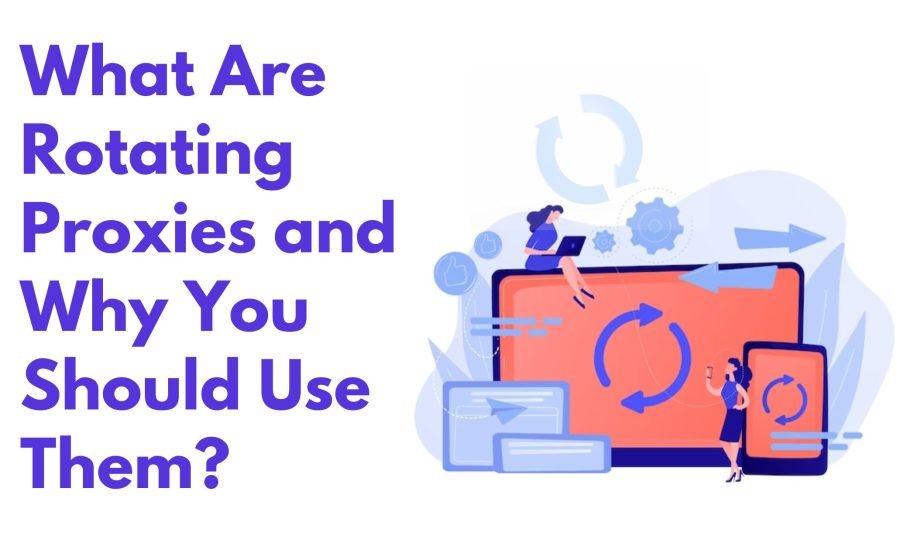Rotating proxies may sound complex to someone who is just getting into the digital world, but they are a useful tool for anyone who needs to collect data from the web or secure their online identity.
Simply said, rotating proxies are proxy servers that modify the IP address for each request. As a result, the server will automatically change to a new IP address each time you submit a request using a rotating proxy.
Stay with us as we examine rotating private proxies, their operation, and the most common use cases that suit them. So let’s start learning right away!
What are rotating proxies?
Rotating proxies are a type of proxy server that automatically rotates or hides the IP address they use for each connection or at regular intervals. Proxies act as intermediaries between your computer or device and the internet, allowing you to access websites and online services indirectly.
With rotating proxies, instead of using a fixed IP address for all your connections, You have access to a pool of IP addresses. Each time you make a connection, the proxy server assigns a different IP address from the pool, creating the appearance that you are browsing the web from various locations.
What are rotating proxies used for?
Rotating proxies are used for various purposes, including:
1. Web Scraping
Rotating proxies are commonly employed for web scraping, which involves extracting data from websites. By rotating IP addresses, web scrapers can make multiple requests from different proxies, preventing IP-based restrictions or rate limits imposed by websites and reducing the risk of being blocked or flagged.

2. Sneaker Bots and Ticket Reselling
In the world of sneaker releases and ticket reselling for popular events, websites often implement anti-bot measures to prevent automated purchases. Rotating proxies help bypass these restrictions by making it appear as if each request is coming from a different IP address, allowing sneaker bots or resellers to increase their chances of securing limited-release sneakers or event tickets.
3. Ad Verification and Testing
Advertisers and marketers use rotating proxies to verify that their ads are being displayed correctly in different locations or websites. By rotating IP addresses, they can simulate browsing from various locations, ensuring accurate ad verification and testing for targeted campaigns.
4. SEO Monitoring
Search engine optimization (SEO) professionals rely on rotating proxies to monitor search engine rankings and track localized search results. By rotating IP addresses, they can collect accurate data from different locations, without being influenced by personalized search results or region-specific biases.
5. Localization and Geo-targeting
Rotating proxies enable users to access online content or services that are geo-restricted. By rotating IP addresses, users can appear as if they are browsing from different countries, allowing them to access region-specific websites, services, or content.
6. Privacy and Security
Our rotating proxies enhance privacy and security by regularly changing the IP address used for browsing. This helps prevent online tracking, as it becomes more difficult for websites or individuals to link your activities to a single IP address. It also adds an extra layer of security by making it harder for malicious actors to launch targeted attacks or track your online presence.
What are the types of rotating proxies?
You may use rotating proxies in three different ways: rotating datacenter proxies, rotating residential proxies, and rotating mobile proxies. You should be aware of the following information about each of them.
IP addresses offered by datacenters are known as rotating datacenter proxies. As a result of their speed, dependability, and affordability, they are popular for performing market intelligence campaigns, casual web browsing, and providing an extra degree of protection.
These proxies work well for those that require a huge number of IP addresses and don’t care about precise location. Datacenter IPs are useful for brand security, entertainment, and market information.

1. Rotating datacenter proxies
Rotating data center proxies are a type of rotating proxy that uses IP addresses from data centers instead of residential networks. Unlike residential proxies that come from real residential devices, data center proxies are sourced from servers hosted in data centers.
2. Rotating residential proxies
Rotating residential proxies are a type of rotating proxy that uses IP addresses from residential devices or connections. Unlike data center proxies that come from servers in data centers, residential proxies are sourced from real residential networks, making them appear as if regular users are accessing the internet.
3. Rotating mobile proxies
Rotating mobile proxies are a type of rotating proxy that uses IP addresses from mobile devices or cellular networks. Unlike datacenter proxies or residential proxies, which use IP addresses from servers or residential connections, rotating mobile proxies use real mobile connections to access the internet.
What are the feature of best rotating residential proxies?
The best rotating residential proxies typically offer the following features:
1. Large Pool of IP Addresses
A high-quality rotating residential proxy service should have a large and diverse pool of residential IP addresses. The more IP addresses available, the better chances of avoiding detection and IP blocking.
2. Automatic Rotation
The rotating residential proxies should offer automatic IP rotation, either per request or at regular intervals. Automatic rotation ensures that each request uses a different IP address, maximizing anonymity and reducing the risk of being blocked.
3. High Reliability and Speed
The proxies should be reliable and offer fast connection speeds to ensure smooth and efficient browsing or web scraping.
4. Geographic Coverage
The best rotating residential proxy service should provide IP addresses from various locations around the world. This allows users to access geo-restricted content or target specific regions for localization testing and ad verification.
5. User-friendly Dashboard
An intuitive and user-friendly dashboard or control panel is essential for managing proxy usage, viewing usage statistics, and configuring rotation settings.
6. Compatibility and Integration
The rotating residential proxies should be compatible with various applications, browsers, and software used for web scraping, ad verification, social media management, and other tasks.
7. 24/7 Customer Support
Responsive and helpful customer support is crucial, especially when technical issues arise or if users need assistance with the setup and configuration of the proxies.

8. Legitimate Residential IPs
The rotating residential proxy service should ensure that its IP addresses come from legitimate residential networks and are not blacklisted or flagged as proxies.
9. IP Refresh Rate Options:
Some providers allow users to customize the frequency of IP address rotation based on their specific needs. Offering different refresh rate options can be beneficial for various use cases.
10. Money-Back Guarantee
Reputable rotating residential proxy services often offer money-back guarantees, allowing users to test the proxies before committing to a subscription.
It’s essential to choose a reputable and reliable rotating residential proxy provider to ensure the proxies perform as expected and comply with legal and ethical use.
Conclusion
In terms of, the time and work they may save you, rotating proxies are a great value. Check out Proxiesforrent finest value offerings for residential, mobile, or datacenter proxies if you’re prepared to optimize your IP rotation procedure. Send a message to our always-available support staff if you have any queries about how it functions or which tools are ideal for your use case.
FAQ
1. Are free proxy lists safe?
Free proxy lists may not always be safe, and using them can come with significant risks. While some free proxies may be legitimate and usable for basic tasks, many of them have inherent security and privacy issues that can expose users to various threats. Here are some reasons why free proxy lists may not be safe.
2. What is a proxy list?
A proxy list is a compilation or collection of proxy servers’ IP addresses and associated details that are available for public use. Each entry in the list typically includes an IP address and a port number, which users can configure in their web browsers or software applications to route their internet traffic through the specified proxy server.
3. Should I use sticky or rotating proxies?
The decision to use sticky or rotating proxies depends on your specific use case and requirements.
4. What is a rotating proxy service?
A rotating proxy service is a type of proxy service that provides users with access to a pool of proxy servers with multiple IP addresses. The main feature of a rotating proxy service is its ability to automatically rotate or change the IP address for each connection or at regular intervals.



